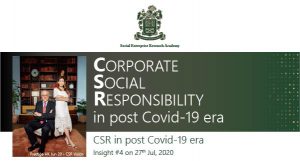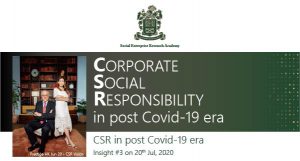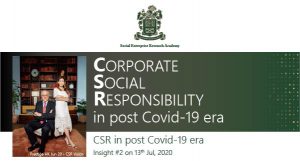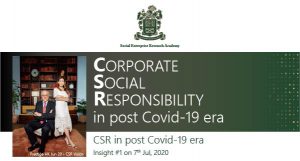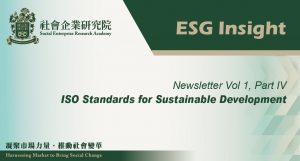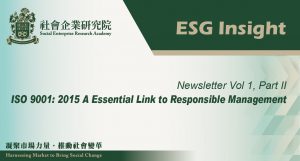

Social enterprises have been popular in many developed countries for years. They mainly make up for government policies or administrative deficiencies, help the disadvantaged and develop the society. United Kingdom has a long history of social enterprises and is considered as one of the country with the most vigorous development of social enterprises. Last month, I went to the United Kingdom to learn from a social enterprise, The Big Issue. I hope to apply what I have learnt in UK on the operation of social enterprises in Hong Kong to promote the development of our Academy and other social enterprises in the city.
Founded in 1991, The Big Issue has allowed the marginalized to be magazine hawkers, selling The Big Issue magazine to the public and earn wages to pay off their living expenses and improve their living standards. The Big Issue has resolved the economic hardships for tens of thousands of people.
This operation model is believed to be the impression of The Big Issue by the general public. “The magazine business of The Big Issue is basically at very low-profit, the profit is actually insignificant to the whole group” said by one of the person in charge of The Big Issue. In fact, over the years, The Big Issue has gradually transformed into a social enterprise focusing on social investment, and “Big Issue Invest” is the agency responsible for social investment for the group.

They mentioned that due to the indifferent attitude of the government towards welfare policies, The Big Issue is currently taking over some projects that were led by the government, such as social charity projects and the development of social enterprises. This provided an opportunity for The Big Issue to provide resources that is currently lacking under the current social security system.
“We use different channels to raise funds, and donations can be used to fund start-ups, conduct social investments, or long-term investments, such as housing, transportation, etc.” They said: “Our operation is not focused on profits. Most of our investment will become funds for the operation and development of the social enterprise.”
Data shows that The Big Issue Foundation manages £150 million (approximately HK$1,525 million). The investments and loans granted by the Foundation range from £20,000 to £3 million. The Foundation will not only carefully review the company before investing, it will also assist the recipient in implementing Corporate Social Responsibility (CSR), which will lead to a positive change of the enterprise. “Our long-term goal is to enable recipient companies to fulfill their social values,” they said.
The Big Issue welcomes other organizations or recipient organizations to share its brand in order to promote the concept of CSR; Just like its own magazine business, affiliated organizations could use their brand once they promised to implement the objectives of The Big Issue, such as allowing the lower class to sell magazines to improve their living.
With this method, magazines are distributed in many countries such as France, Taiwan, Japan, South Africa and Australia. The headquarters of The Big Issue will not interfere with the content published in the other countries, nor will it take a share of operating income from overseas divisions.
However, while The Big Issue supports or invests in other charitable organizations, they encountered a rather contradictory situation in which organizations they support directly provided assistance, including financially, to the disadvantaged. “This is contrary to our policy of “teaching them how to fish instead of fishing for them””, they told me.
On the other hand, electronic payment is now popular and gradually becoming an important part of our lives. In response to this, they allowed payments being made by scanning the QR Code, making it easier for consumers to pay. However, they told me that hawkers were not very enthusiastic about electronic payment as a number of hawkers are drug addicts. Once they use the electronic payment, they might be monitored, making it difficult for them to buy drugs.
(The author, Miss Bonnie Liao is the publisher of the magazine “the Creator” and the General Director of Social Enterprise Research Academy)













